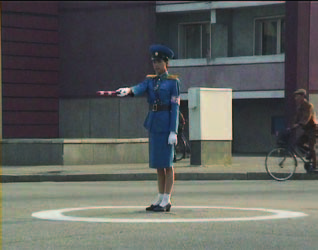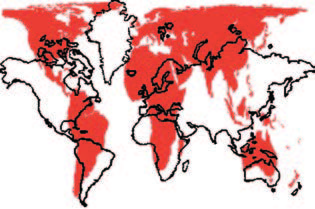In North Korea human rights are not violated, they do not exist at all.
The 20th century has disenchanted the world, revealing the cruel truth about the evil endemic to human nature and shocking the world with machines of mass-death worse than anything that came before. Today, the totalitarianism of the last century is gone. Instead, we have democracy. But in some countries the genocide has continued. Only most of us, citizens of the free world, turn our backs. We cared when it was happening to us and our neighbors, but now we wince at the sight of oppression, complaining that living in awareness of world’s atrocities makes for a dreadful life. Yes, in the “Workers’ Paradise” of North Korea, life is dreadful. But, unlike us, the North Koreans cannot just turn away.
Human rights do not exist
In this small country, viewed as peripheral by the “modernized” world, human rights are best described not as something being violated; it is much closer to the truth to say that in North Korea human rights do not exist. Lots of things that are viewed as immoral and are typically penalized in the so-called “free world” are merely an integral part of North Korea‘s system. The oppression has existed for over half a century, since the end of the Korean War in 1953. From the North Korean point of view, atrocities are normal.
One of the most significant problems is the rampant starvation, suffered by a majority of the population. But the climate in North Korea is not harsh. So why the lack of food? The responsibility lies with the government‘s thievish politic of redistribution. Most of the provisions go to Phenian, directly into the hands of the party members. The closer to the top you are, the more you get. The provinces get much less. In theory, the amount of foreign support being fed into North Korea could easily spell freedom from hunger for all of the citizens, but the government does not allow the aid transports into those regions where they are most needed. Different “categories” of people receive different amounts of food. The independent organizations report that the average daily portion for children is 200-300g of food. Teenagers and pensioners get about 400g. The soldiers and workers are given more – 900g. The resulting permanent hunger causes diseases of deficiency and malnutrition, especially to children, affecting their growth as well as their ability to learn. When harvests are poor the situation becomes even more dramatic, as in the period 1996-97, when about 300,000 people died of famine. Anyone guilty of stealing food was sentenced to death. Limiting the supply of food has been a powerful weapon of the Korean authorities against the people of Korea.
“WE ARE SO HAPPY IN OUR FATHERLAND” words on a banner displayed during a demonstration in Phenian North Korea, instead of being a country governed by the idea of national unity, is a world split in two. The German doctor Norbert Vollerstern remembers working as a volunteer in the factory hospitals of North Korea and later being sent to a hospital in Phenian. He describes the stark contrast between the shortages of such staples as basic medicines and bandages in the factory hospitals and the fully-equipped modern hospitals in the capital. Only these were reserved for the privileged – not only do they not treat the “average citizens” – they don‘t even permit them to enter these world class facilities. Even those fortunate enough to live in the nation‘s capital live in a cruel reality. The Parade, a film by Andrzej Fidyk, presents some episodes out of a person‘s life in Phenian. Images of the constant celebrations and parades show millions of people in identical clothing waving flags and decorations in perfect synchronization. The patriotic fervor is supported by hymns glorifying the Leader. We see an image of a crowd from above. In unison, the people contort and create the inscription “we love our Leader.” A few seconds later, some squat, others raise colored panels, and suddenly we see the face of Kim Ilsung set against a backdrop of the national flag. “The Great Leader Comrade” likes to watch these rituals from above. Enthusiasm abounds wherever he appears. Everyone is called upon to prove his or her love. Denunciation is each citizen‘s patriotic duty.
Fidyk shows us the true face of the capital community. He shows what is viewed as “best“ in North Korea, and the way this parade of glee is used to educate the rest of the citizens. Or is it to brainwash them? In democratic countries, Fidyk‘s film is received as sad evidence of totalitarianism. It captures the difference between true democracy and one that is merely an image out of a propaganda show. The Parade is also poignant because there is no announcer telling us what to think: every word uttered in the movie is spoken by a North Korean. Only the title hints at the filmmaker‘s view of the reality captured on film – rigorous, disciplined, well-rehearsed, obedient, like a military parade sent through the city to mobilize the people.
Myulhada means “to destroy“
The obligatory cult of the political leader, limitation of people‘s civil liberties, and far-reaching forms of social control are merely some of the injustices rampant in North Korea. There‘s the lack of free media. There‘s the dramatic legal extermination. All of these issues are connected, and all keep the citizens in a constant state of fear. Fear guarantees obedience. And the undercover police hunt for the “enemies of the revolution” deepens the people‘s fear. In North Korea, the “enemy” is not merely the dissident who stands against the regime, but also every member of his family – even three generations back. Detentions in North Korea are often made without a sentence. In the prisons people live under inhuman conditions, suffering torture and rape. Prisoners are often forced to kill other prisoners. Camps are an important part of the North Korean system, serving as an instrument to destroy parts of the nation. They are also the foundation of the existing economic system, in which the incarcerated work in mines and factories as an unpaid and self-renewing labor force. When the number of workers drops beneath a minimum, the oppressors send in new ones. The authorities are well prepared, keeping special reserve lists of “suspects.“ The number of prisoners in the labor camps is estimated to equal between 100,000 and 300,000.
To be born in a trap
The people in North Korea are cut off from the rest of the world. The national media create a world and feed this depiction of it to the citizens. It is virtually impossible to escape. There is only a wall to the south, China to the north. The borders are carefully guarded. Any attempt to cross them is a crime. On the Chinese side there flourishes a slave trade. Few have managed to escape. It‘s thanks to them that we know what is happening in North Korea. Nothing indicates that that things are going to change.
We don‘t know if the people want to resist. It is difficult to influence the regime from the outside. As long as it has the support of China, Phenian does not care about UN resolutions. The nuclear program is running at full speed. Even now Seoul is in the range of missiles from the North. On the international forum, instead of alarm, we feel only incapacity. The advantages coming from the peaceful trade with China seem much more important to our leaders than the dire situation in North Korea. Until people realize our responsibility toward the North Korean people – because we‘re all in this together – they will be alone, waving the flag, singing hymns, and wondering if they‘re next on Kim Ilsung‘s list of suspects.










